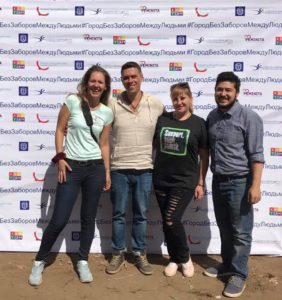
Author: Marina Maximova, Kazakhstan
It has been a year since the project Fast-track HIV/TB responses among key populations in cities of Eastern Europe and Central Asia (HIV/TB CITIES) has been operating in Almaty, Balti, Odesa, Sofia, and Tbilisi. Different countries, contexts, mentalities and different… results. Roman Dudnik, Executive Director of the Public Foundation AIDS Foundation East-West in Kazakhstan is telling about the project implementation in Almaty, Kazakhstan.
– Roman, one of the results of project implementation is a major and important outcome not only for the city, but also for Kazakhstan in general – the Almaty akimat (regional executive body in Kazakhstan – editor’s note) has signed the Paris Declaration. That is a high standard. Do you manage to keep up with it?
– In summer 2017, Almaty became the first city in Central Asia joining the Paris Declaration to end the AIDS epidemic. It is a crucial step for the city as along with Pavlodar, Karagandy and East Kazakhstan regions it has the highest rate of HIV prevalence in the republic. That is why we really need to take popular actions and measures, which will help us to draw attention to this problem and stop the growth of the HIV epidemic. The declaration was signed not only “for the record” as they say. There is an interest to this topic from the side of the municipality and it does not fade. Using this momentum, we hope to implement our project in the most effective way and make further, not less ambitions steps – develop an effective city model of HIV and tuberculosis (TB) response and increase the share of municipal funding allocated for the prevention programs among key populations.
– Do you feel any support from the side of government authorities? How tricky is the East?
– I worked in Russia for years and I saw the attitude of government officials to civil society organizations there… Fortunately, in Kazakhstan the situation is entirely different. I was even surprised that mazhilis (lower house of the Kazakhstan Parliament – editor’s note) deputies can meet with non-governmental organizations (NGOs) or people from akimat can refer to NGOs as their partners. If at first it seemed that akims (heads of the local executive bodies in Kazakhstan and Kyrgyzstan – editor’s note) are out of reach, and the topics of HIV and harm reduction are not their top priorities, the HIV/TB CITIES Project has changed the perception of priorities and significance of this issue, and it is not only my perspective. Here if people commit to something, they do it. Maybe they are not very loud and showy about it, but they surely reach good results. Several years ago, 18 confidential counseling points were opened in Almaty, where people can get tested for HIV and other diseases, receive relevant specialists’ consultations and awareness-raising materials or exchange syringes. Today they are already funded from the municipal budget and supported by the local authorities.
Public officials in Almaty are very busy people with a lot of things to take care of. Not all of them know about the scope of HIV problem, they do not have time for it. They need information and are grateful when they receive it, in particular from NGOs. In this chain, we became allies. The first achievement of the HIV/TB CITIES Project was the development of an order to create an HIV/TB City Task Force at the Health Department of Almaty. Here an order is equal to a law: it is strictly implemented and controlled. All meetings of the Task Force, which are held every quarter, are recorded, and its decisions are implemented with no time-consuming bureaucracy. One of the outcomes is that medical professionals now more actively attend training workshops on HIV prevention, stigma and discrimination, which are held by community leaders.

– Roman, what are the other activities, which marked the first year of the Project implementation and what are you plans for the nearest future?
– With the support of Almaty AIDS Centre , an assessment was made of the HIV and TB situation and the needs of key groups. Through focus groups, the main factors were identified, which influence reducing the HIV morbidity in every key population. It will allow developing an effective model of response to the epidemic. A memorable event was the city community festival Art Energy Almaty. Work in Progress. Our community platform was called “The city with no fences between people.” It was the time when a lot of fences between buildings and near the roads were dismantled in Almaty to make the city more free and open. Our message – that the main fences usually exist between people, and we are the ones who can ruin them – got together people living with HIV, LGBT, people with drug use history and sex workers at our platform. It was the most popular platform. Our visitors liked listening to frank stories with open faces. We have already launched an operational research of the model stipulating low-threshold access to HIV testing and treatment for people who inject drugs. We plan introducing rapid oral HIV tests. Besides, preparations are in progress for the Almaty akimat to sign one more important document to demonstrate the political commitment to ending TB – the Zero TB Declaration.
– Do you plan to take part in the XXII International AIDS Conference (AIDS 2018) in Amsterdam?
– Yes, of course. I am sure that this forum will become a platform for intensive knowledge sharing and discussing the efforts of governmental, non-governmental and international organisations in response to the HIV epidemic. We have got our messages and suggestions to come up with.



